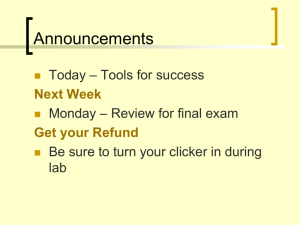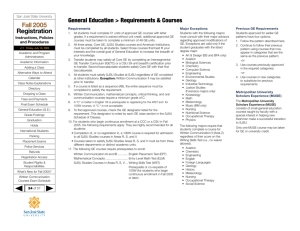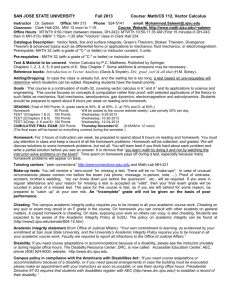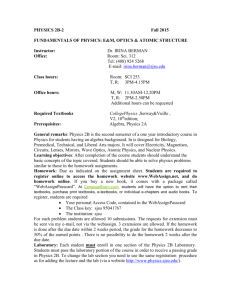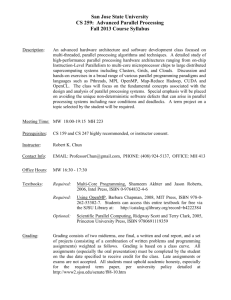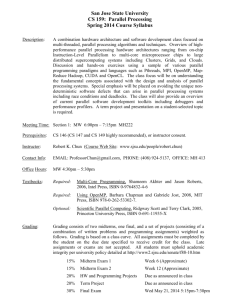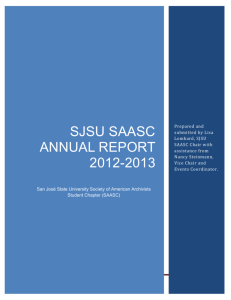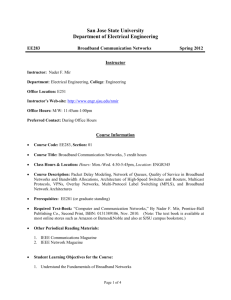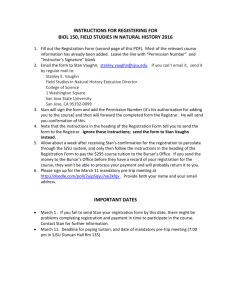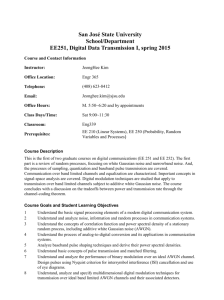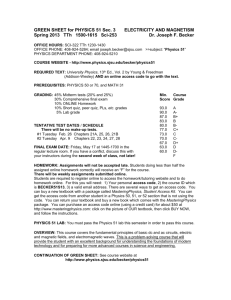HRTM 097B - San Jose State University
advertisement
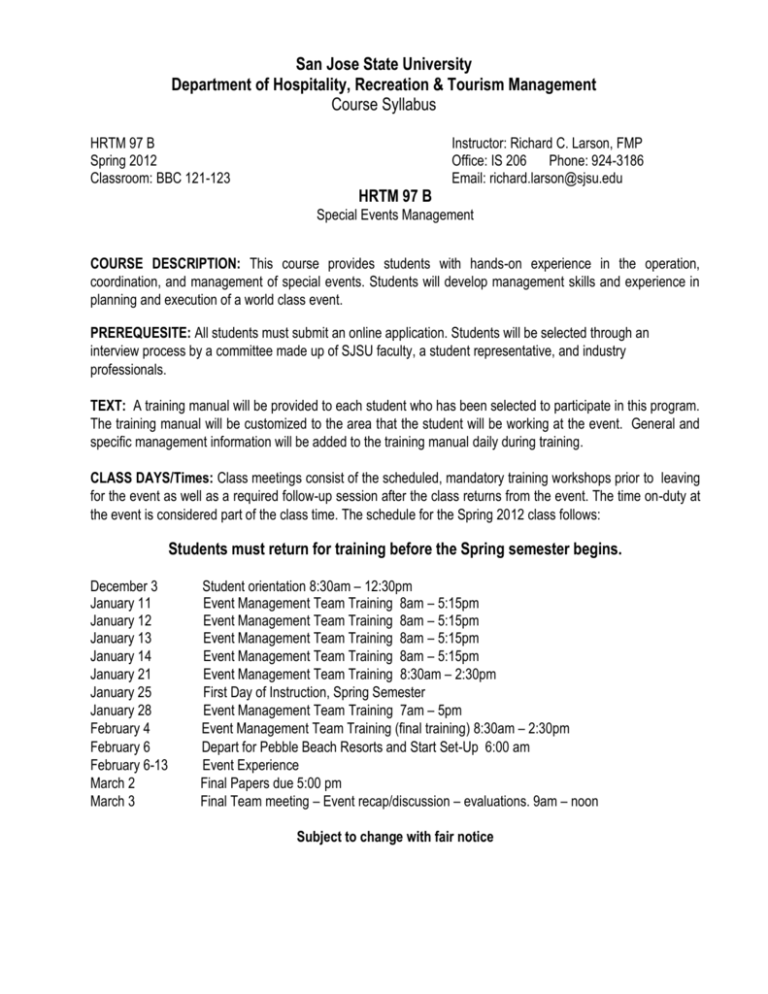
San Jose State University Department of Hospitality, Recreation & Tourism Management Course Syllabus HRTM 97 B Spring 2012 Classroom: BBC 121-123 Instructor: Richard C. Larson, FMP Office: IS 206 Phone: 924-3186 Email: richard.larson@sjsu.edu HRTM 97 B Special Events Management COURSE DESCRIPTION: This course provides students with hands-on experience in the operation, coordination, and management of special events. Students will develop management skills and experience in planning and execution of a world class event. PREREQUESITE: All students must submit an online application. Students will be selected through an interview process by a committee made up of SJSU faculty, a student representative, and industry professionals. TEXT: A training manual will be provided to each student who has been selected to participate in this program. The training manual will be customized to the area that the student will be working at the event. General and specific management information will be added to the training manual daily during training. CLASS DAYS/Times: Class meetings consist of the scheduled, mandatory training workshops prior to leaving for the event as well as a required follow-up session after the class returns from the event. The time on-duty at the event is considered part of the class time. The schedule for the Spring 2012 class follows: Students must return for training before the Spring semester begins. December 3 January 11 January 12 January 13 January 14 January 21 January 25 January 28 February 4 February 6 February 6-13 March 2 March 3 Student orientation 8:30am – 12:30pm Event Management Team Training 8am – 5:15pm Event Management Team Training 8am – 5:15pm Event Management Team Training 8am – 5:15pm Event Management Team Training 8am – 5:15pm Event Management Team Training 8:30am – 2:30pm First Day of Instruction, Spring Semester Event Management Team Training 7am – 5pm Event Management Team Training (final training) 8:30am – 2:30pm Depart for Pebble Beach Resorts and Start Set-Up 6:00 am Event Experience Final Papers due 5:00 pm Final Team meeting – Event recap/discussion – evaluations. 9am – noon Subject to change with fair notice STUDENT LEARNING OUTCOMES: On completion of this course, the student will be able to: 1. 2. 3. 4. 5. 7. 8. Explain the logistical considerations underlying successful service at special events, such as a major sporting event. Assess his/her strengths and weaknesses in employee relations and the management of personnel. Compare the requirements for inventory management during a special event with inventory management of a table service restaurant operation. Be familiar with techniques used for effective cash management to optimize sales revenues during special events and explain the rational for the selection of the techniques used. Summarize the service concept, as applied to the planning and implementation of special events. Demonstrate an understanding of client concerns in order to provide successful management of corporate recreation and/or hospitality facilities. Explain the need for speed and efficiency as well as product quality/customer satisfaction, as critical factors in optimizing revenue and profit during special events. GRADING PLAN Presentations Class Participation Event Performance Exam Culminating Assignment Total GRADING SCALE: 96 – 100 93 – 95 90 – 92 86 – 89 83 – 85 80 – 82 76 – 79 73 – 75 70 – 72 66 – 69 63 – 65 60 – 62 59 and below 50 points 100 points 250 points 50 points 100 points 550 points A+ A AB+ B BC+ C CD+ D DF 2 COURSE REQUIREMENTS: 1. Students will attend ALL SESSIONS of the training workshops. Attendance will be taken at all workshop sessions and at all other scheduled class sessions/activities throughout the semester. Students unable to attend a session for any reason (i.e., in the hospital for some type of emergency surgery, death in the immediate family, etc.), MUST provide either a letter of explanation for the absence (illness or other unanticipated emergency) OR a letter requesting excusal (funeral or other event known ahead of time) to the course instructor. All requests will be considered on a case-by-case basis. Students, who fail to attend classes and who do not have a valid excuse or emergency may lose the opportunity to participate. 2. Professional attire is required for training workshop sessions as scheduled. The SJSU Career Center web site offers tips on proper business attire. Students in this class will function as professional managers training for positions at prestigious events. It is presumed that they will look and act as professionals "on-the-job" and throughout the training process. 3. Each student is responsible for keeping a journal of their experiences and completing a written report of their experiences in this course, particularly at the special event site. Details are specified in the materials distributed regarding the written post event paper. 4. There will be assignments distributed from time to time during the training sessions, which will be collected for evaluation as a part of a student's grade. 5. At the event site, students are expected to behave in a professional manner that reflects well on SJSU, as well as the firm with which they are working. 6. All students are expected to BE ON TIME for all meetings and other events. Plan ahead and ask questions if you are unsure of anything. While on-site, students are expected to be on-the-job AT THE TIME THEY ARE SCHEDULED. Failure to appear as scheduled may be reason for on-site disciplinary action, depending on the situation, as no manager in an area can be a cause for serious concern for the company with which SJSU is working. 7. Students are expected to contribute positively and effectively to group activities, during the oncampus training periods and especially while at the event site. NOTES: 1. A conflict with a student's work schedule is not an acceptable reason for an excused absence as students are aware of the scheduled training dates well in advance. Students are expected to arrange their work schedules accordingly 2. Participants are expected to know each person in the class by name -- both first name and last name - prior to departure to the special event. 3. Social activities may be planned from time to time. Participation in these events is OPTIONAL, although students are encouraged to attend to get to know other class members better. Conflicts with jobs, other classes, projects due, and other life activities are recognized. Dress for such events would be that appropriate to the type of event and where it is held. 4. ALL CLASS MEMBERS ARE EXPECTED TO HAVE AN E-MAIL ADDRESS. Students are expected to check their email and the Event Management Class Website on a daily basis during the two weeks training prior to departure. 5. Work assignments for students at the event sites will be determined by site Management with which SJSU is working. While students may indicate their area of interest, such indication is no guarantee of an assignment. The jobs available and the responsibilities associated with each job are determined by the firm with which we are working - not SJSU or the course instructor. 3 6. Students should remember that guests at the events view the student managers as employees of, and thus representatives of, the firm for which SJSU is working. As such, they can have an important impact on the impression of guests and clients about these companies. 7. The SJSU faculty member(s) working on-site with the class is(are) the final authority on decisions to be made regarding any aspect of the group's relations with the cooperating firm, student’s behavior, work assignment concerns, travel and housing arrangements or any other matters that may arise. 8. The SJSU faculty member working on-site with the class has the authority to send any student back to San Jose AT THE STUDENT'S PERSONAL EXPENSE at any time, should an event occur or the student's general behavior on site, warrant such action. 9. Students will need to make arrangements with instructors of other classes to complete any missed assignments. Students who work will need to adjust schedules with their employers in order to attend all training and work sessions. ACADEMIC INTEGRITY Faculty will make every reasonable effort to foster honest academic conduct in their courses. They will secure examinations and their answers so that students cannot have prior access to them and proctor examinations to prevent students from copying or exchanging information. They will be on the alert for plagiarism. Faculty will provide additional information, ideally on the green sheet, about other unacceptable procedures in class work and examinations. Students who are caught cheating will be reported to the Office of Student Conduct and Ethical Development of the University, as prescribed by Academic Senate Policy S04-12. The policy on academic integrity can be found at http://www2.sjsu.edu/senate/S04-12.htm. Violations of academic integrity include, but are not limited to, cheating, plagiarism or misrepresentation of information in oral or written form. Plagiarism means presenting someone else's idea or writing as if it were your own. Such violations will be dealt with severely by the instructor. If you use another person's idea or writing, be sure, the source is clearly designated. “The University emphasizes responsible citizenship and an understanding of ethical choices inherent in human development. Academic honesty and fairness foster ethical standards for all those who depend upon the integrity of the University, its courses, and its degrees. CAMPUS POLICY IN COMPLIANCE WITH THE AMERICANS WITH DISABILITIES ACT: If you need course adaptations or accommodations because of a disability, or if you need special arrangements in case the building must be evacuated, please make an appointment with instructor as soon as possible. Presidential Directive 97 – 03 requires that students with disabilities register with DRC to establish a record of their disability. 4
